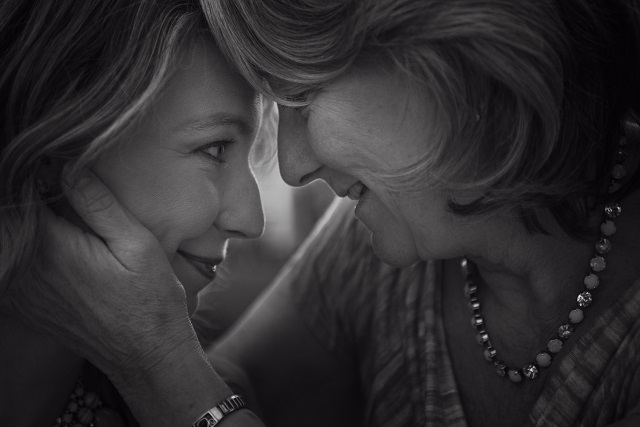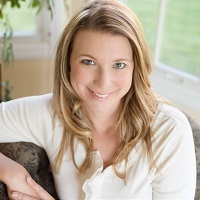
I’m part of the Sandwich Generation and, until recently, I had no idea what the hell it was.
For those as clueless as I was, the Sandwich Generation describes people who must care for sick or aging parents while raising their own young family.
Sounds sh*tty, right?! Well, it is.
We are literally sandwiched between two needy sets of people who we love, but who also rely on us to survive and thrive. As a bonus, we get to be riddled with guilt, anxiety, self-doubt, stress, and anger. Great.
I qualify as part of the Sandwich Generation because I’m in my 30s, care for my 67-year-old mother, who has moderate Alzheimer’s disease, and have a husband and two elementary school-aged children.
The generation part is what I find most encouraging because, contrary to how I feel, it implies that there are a lot of people in same boat as me. I thought I could cope better if I found others who are also torn between caring for their children and their parent(s).
My first attempt was attending an Alzheimer’s caregiver support group. I worried that I’d be sitting in a room full of people who could be my parents, or worse, my grandparents. Someone had to be there from this Sandwich Generation—someone else who knew what it was like to be thrust into this club without consent. We would hit it off and be able to support each other, because we get it.
I arrived at the meeting tired and stressed from dealing with the normal events of my daily life, but I was hopeful. I walked into the building and stopped to ask the receptionist which room the meeting was in. She proceeded to tell me there was no meeting that night because someone forgot to coordinate it. Seriously? Someone forgot to schedule a meeting for Alzheimer’s caregivers?
The irony of the situation wasn’t enough to turn my tears into laughter—at least not that night anyway.
The guilt and anxiety that plagued me started taking a toll on my health. I wasn’t the wife, mother, or daughter I wanted to be, or needed to be.
I eventually reached a point where I had to choose to help myself. I had to find ways to not only cope with my situation, but improve it. I had to take matters into my own hands. I had to create the balance and peace I so desperately needed.
No matter what a parent is going through that requires their child to care for them—old age, disease—everyone involved is affected. It’s hard for us to see our parents sick, frustrated, or losing their independence. No parent wants to be parented by their child, and unfortunately that is what a lot of our job requires. Add in trying to care for a family of our own, and it can tip our patience scale to nonexistent.
We often feel the closest bonds to our parents, our children, and our spouse. But there are many days when it feels like they are all standing in a line and someone is asking us, “Who are you going to sacrifice today?”
Before I changed my perspective and discovered some coping mechanisms, a little of me died each time I had to make that choice. I worried that all this choosing would wear away at who I was and the people in my life would suffer greatly because of it. We would all lose.
It’s amazing how the universe knows what we need and nudges us in the right direction at the right time, if we choose to listen. I’m a health coach, so I started taking more of an interest in the practice of mindfulness. It saved me.
I do want to take a moment to mention that I did seek counseling, which helped me deal with my conflicting emotions. And I’m glad I did it. However, mindfulness gave me something that counseling didn’t. It taught me to be present in each moment of each day. I spent so much energy worrying about what was going to happen as my mom progressed and how to manage it all that I was suffocating.
For caregivers dealing specifically with Alzheimer’s disease or cognitive impairment, the one thing we can count on is that we can’t count on anything. There is zero predictability. The symptoms of those affected can change from day to day, sometimes minute to minute. It’s a hard pill to swallow for someone like the “old me,” a Type-A caregiver who likes to be prepared.
Mindfulness taught me not to linger in the past and waste energy wishing my mom was her old self again, but instead focus on who she is today. It taught me not to waste energy on all the “what ifs” of the future. After all, 85 percent of what we worry about never happens.
Mindfulness taught me to take each day as it comes and handle each situation one at a time, and then move on. I can now enjoy each good moment: the ones when I’m with my kids and husband without needing to handle a situation with my mom, the moments when my mom is happy, when she is in touch with reality, when she can do things independently, and when it’s just quiet. These moments are no longer negated by the worries of the future.
I never thought that this would be my life—that in my 30s I would lose my dad to a heart attack and lose my mom, as I knew her, to Alzheimer’s disease. Or that my daughters wouldn’t have the young, vibrant, involved grandparents they had when they were babies, or have a mom who must determine if they, or their Mimi, need her the most at any given time.
I grieved this life for far too long until one day I came to terms with the fact that none of us are entitled to a perfect life. In fact, there is no perfect life. Our stories are each unique and hard and beautiful, and they make us who we are.
We’ve all heard the quote “Life can make you bitter or better,” or one of its many variations. Today, I choose better.
Mindfulness has allowed me to choose better. I was desperately looking for someone to help me cope as part of the Sandwich Generation. What I didn’t realize is that I had the power to help myself all along.
My hope is that you find what your soul needs to heal.
~
Relephant:
14 Benefits of Mindfulness. {Infographic}
~
Author: Jill Sodini
Image: Author’s own
Editor: Nicole Cameron
Copy Editor: Callie Rushton
Social Editor: Waylon Lewis











Read 0 comments and reply